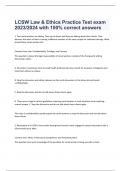Prüfung
LCSW Law & Ethics Practice Test exam 2023/2024 with 100% correct answers
1. Two social workers are dating. They are at dinner and they are talking about their clients. They discover that each of them is seeing a different member of the same couple for individual therapy. What should these social workers do? Content Area: Law: Confidentiality, Privilege, and Consent ...
[ Mehr anzeigen ]






